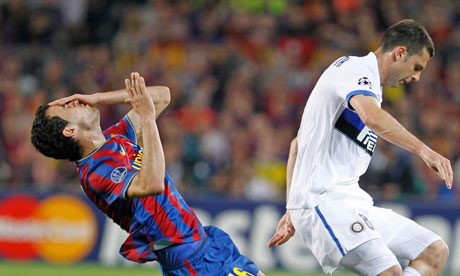 Written by Howard Hockin
Written by Howard Hockin
There were plenty of metaphorical pats on the back for Rio Ferdinand recently when during the Spurs v Manchester United match he told Rafael not to wave an imaginary yellow card at the referee, as this sort of behaviour was not tolerated. Foreign players with British clubs have been berated by team-mates before when doing this, as happened with Fabrizio Ravanelli and Mikel Arteta in their first seasons in the Premier League.
It seems that in this country, waving an imaginary card at the referee is akin to serial killing or questioning a woman’s knowledge of the offside law. This is nothing new. In October 2005, the Daily Mail ran a campaign to rid the game of this “evil”.
Players will be told to cut out the imaginary card-waving to encourage referees to book a rival as part of the drive to rid football of the problem.As Sportsmail’s campaign to punish the perpetrators drew support from all parts of the game yesterday, the FA Premier League is taking steps to address the issue.
Referees’ chief Keith Hackett will ask PFA chairman Gordon Taylor when the pair next meet to remind his members of their responsibilities, not only to the game but to each other.
Hackett will also stress to Taylor that refs already have the power to book players for waving an imaginary card and that the pre-season agreement for more respect towards officials from players and managers is being compromised.
Graham Barber, who retired as a Premier League referee in 2004, said:
“I’d like to feel that if cautions were introduced, it would act as a deterrent with clubs telling their players to stop doing it. But if this was introduced, it would be up to everybody – clubs, players, managers and the media – to support referees.”
Former West Ham striker Tony Cottee also backed the campaign. Now a Sky Sports pundit, Cottee said:
“Those players who do this should be booked. Absolutely. I’ve been saying it for two or three years since it came into England. Action is long overdue. When a player waves an imaginary card, the referee should say: ‘Yes, it is a yellow card, but it’s for you’. It’s just unacceptable, trying to get a fellow pro into trouble. It’s the referee’s job to decide whether a foul deserves a yellow card.”
In 2006, there was talk from UEFA of ensuring a similar clamp-down. That paragon of virtue John Terry has moaned in the past about Barcelona players doing it. An article in When Saturday Comes touched on the same theme last year.
There is nothing that annoys football commentators more than seeing players wave an imaginary card after they have been fouled. Jonathan Pearce, Peter Drury and co seized on such displays during the World Cup with weary despair. Some of the things imported into British club football from abroad in recent times are tolerated – over-elaborate stepovers and wearing undershirts displaying messages for God are just about acceptable – but the card mime is beyond the pale.
Of course the card waving is gamesmanship, just like stealing a few yards at a free-kick or claiming a throw-in that you know is for the opposition. But you can see why it developed when teams get away with blatant thuggery as Holland did during the final.
The thing I don’t get is this: a large percentage of players spend games trying to con the referee – why does this particular action get so much attention?
Is it the horror it provokes at trying to influence the referee? Or the idea that there is nothing lower than trying to get a fellow professional dismissed, or at least punished with a yellow card?
jjj
hahaha